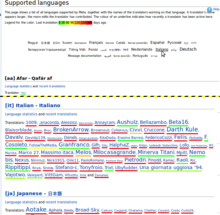帮助:扩展:翻译/统计和报告
该翻译扩展提供了许多统计和报告。 Most of them are updated in real time. 其中大部分都会实时更新,它们主要显示在四个特殊页面中:LanguageStats、MessageGroupStats、TranslationStats和SupportedLanguages。 前两个是相同数据的不同视图:每种语言每个信息组的翻译完成百分率。 后两者能帮助翻译管理员分别从高层次视角和近场详细视角跟踪翻译社群的活跃度。
翻译者可通过它们查找待译内容、项目协调员及查看进度。此外他们还能让维基社群形象化并服务许多潜在用户。
单语言所有信息组的翻译统计

Special:LanguageStats 页的主要潜在用户是翻译者。 它为翻译者显示了所有待译信息组和每组仍包含多少未译信息等的状态总览,便于寻找要翻译的内容。 它还可以过滤完全未翻译的信息组、完全翻译的信息组(默认)或同时过滤两者。
翻译管理员可以把信息组分类为更大的组,这样这些组在统计表中可以展开有助于翻译者选择自己感兴趣的项目。 这种信息组的集合被称为聚合信息组,会以粗体显示出来。 粗体也可用于二级信息组,它们与别的信息组共享部分或所有信息。 translatewiki.net 上的示例是 MediaWiki 稳定分支的信息组,包含了“MediaWiki 中 500 个最常用信息”的分组。
如果信息组使用了工作流状态,则这些也会显示出来。
此页可以通过 {{Special:LanguageStats/nl}} 这样的语句包含在wiki的其他页面上,其中 nl 可以替换为任何语言代码。默认隐藏完全翻译的分组,不过您可在特殊页面显示的过滤器中使用类似 {{Special:LanguageStats/nl|suppressempty=1|suppresscomplete=0}} 这种语法进行控制。
所有语言所有信息组的翻译统计
Special:MessageGroupStats 的主要用户为翻译和项目管理员。 本页提供了多种语言的信息组翻译完成度总览。 可以过滤完全未翻译的语言(默认)、完全翻译的语言或两者。 还可以看到哪些语言已翻译足够、哪些需要在截止日期前实现目标以及哪些才刚开始。 您可以在语言和翻译者列表中找到某种语言的翻译者。
如果信息组使用了工作流状态,则它们也会显示在本页。
通过 {{Special:MessageGroupStats|group=groupid}} 语法可在其他地方包含该特殊页面,其中 groupid 可以替换为任何有效的分组标识符(group id)。
您还可以使用 {{Special:MessageGroupStats/groupid}} 语法,不过如果分组标识符包含斜线则会失效。
默认会不显示没有任何翻译的语言,不过您可在该特殊页面显示的过滤器中使用类似 {{Special:MessageGroupStats|group=groupid|suppressempty=1|suppresscomplete=0}} 的语法进行控制。
语言和翻译者列表

Special:SupportedLanguages 的主要用户是翻译管理员。 这是翻译管理员对于一个wiki的翻译社区高等级的总览。 那里列出了所有已使用的语言,并通过标签云可视化它们的活跃程度。 越大的字体代表越活跃的语言。 还有一个翻译者列表,标注着他们完成的工作量和近来的活跃程度。 翻译管理员可以用这个列表来为紧急翻译任务寻找人手,或者鼓励不那么活跃的译者再次活跃起来。 译者们也可以用它来找到使用自己的语言、活跃并可以与之交流的同伴,由此增进翻译社区中的交流与合作。
活跃图

Special:TranslationStats 的主要用户是 翻译管理员。 这个页面充当了监察社区和生成优质图表的工具。 你可以选择绘制下列参数中的任何一个 (一次仅限一个):活跃译者数、编辑翻译数、审核翻译数、审核者数和新注册用户数。 你可以选择报告的时间尺度和图片大小。 预览图表还会生成一个wikitext。 可以把wikitext复制到任何页面以包含该图表。
为了比较,可以将图表的显示范围限制于特定的一些信息组,或特定的几种语言。这样就可以激发一些良性竞争并提升翻译活跃度。比如,可以绘制为MediaWiki核心进行的芬兰语、瑞典语、挪威语和丹麦语的翻译的图表,并把它放在一个显眼的位置。
这个页面能否访问,取决于是否安装并配置了PHPlot。图表是本地化的,但是服务器必须配有所有文字的字体。甚至一些很好的字体也无法正常显示某些语言。
所有语言的翻译
Special:Translations的主要用户是翻译管理员。这个页面列出了某个给定信息组所有的翻译。通过它,翻译管理员能够轻松地进行维护和比较不同的翻译。只需点击一下,就能显示每条信息的历史和翻译编辑者。
图表会被保留数小时,但基本上它们都是实时更新的。
关于半自动化的大批更改,参看extension Replace Text或Pywikibot。若要导出,可以查看action API module。
最新变化、推送和日志
所有用户都能受益于Special:RecentChanges。在这里可以追踪所有与翻译有关的工作。可以添加过滤器来改善使用。在页面翻译中,当每次编辑都是通过翻译单元页面进行,并复制到翻译页面,导致未过滤页面中混杂着两种事项时,过滤器尤其实用。
这些是对于最近更改的过滤选项:
- "不过滤": 不过滤,显示全部内容。
- "仅显示翻译":只显示所有系统消息的编辑,它们的翻译和翻译名字空间。
- "滤除翻译": 隐藏符合前面选项的所有编辑(默认选项)。
- "与网站语言相同的消息的更改":只显示对于真正用于wiki界面的系统消息的编辑(MediaWiki界面,而非子界面)
过滤器也以同样的方式應用于这些页面及其讨论页上的活动。 For more filters you can install the CleanChanges extension. It provides filtering by user names and language codes and the recent changes list itself contains a smaller subset of information.
所有过滤器都能被用作推送。只需选择想要的过滤器,然后将&feed=atom附加在网址上。比如,在推送阅读器中,可以查看所有以您的语言进行的翻译。示例:https://translatewiki.net/w/i.php?translations=only&trailer=%2Ffi&title=Special:RecentChanges&feed=atom
几乎所有与翻译有关的操作都会被记录,比如将页面标记为需要翻译、复核翻译,等等。这些记录显示在“最近更改”列表中,也显示在 page translation log 和 translation review log 中。

想要跟进最新翻译的译者有多种选择:Watchlist一般用于查看他们的翻译的更新。或者,如果他们想更全面地查看所有翻译,可以在特殊页面,或者上面提到的成组的推送,跟进最新更改。最简便的方式或许是将最新翻译信息组 "Special:Translate/!recent" 和"接受翻译"或"复核全部翻译"任务一起使用。(參见 质量保证)。
The review tasks (currently) also provide the only way to monitor changes to a specific message group: you can select that group and, if you (or someone else) have reviewed its translations before, only the new ones will show up for review.
Translated pages are the easiest message groups to monitor: you can just look at the history of a page, or have a combined view of all changes to all pages on the recent changes page with the "滤除翻译" filter.
静态翻译统计表
The command line script groupStatistics.php allows the creation of custom versions of tables shown in Special:MessageGroupStats.
You can choose multiple groups and the list of languages.
The script can produce output in different formats: text, wikitext or HTML.
Bots or maintenance/edit.php can be used to automatically import the statistics tables into wiki pages.
If you want to keep these tables up to date you have to rerun the scripts regularly (for example daily).
其他有用扩展
用户率

The primary audience for Special:ContributionScores (added by Contribution Scores extension) are translators.
This page produces a rank of users based on the number of edited pages and edits users have made in the last 7 days, 30 days or in all time.
It's useful to see who's been most active on the wiki in the last few days and to compare one's own activity to the others'.
Custom charts can be generated and included in any page, by passing parameters to the special page in the subpage format, for instance: {{Special:ContributionScores/10/0/notools,nosort}}.
These are the parameters used in the previous example:
- The number of users shown in each table.
- The number of days to report on (
0for all time). - A list of comma-separated configuration settings:
notoolshides the standard links to user talk, contributions etc. after each user name;nosortmakes the table not sortable, reducing space requirements.
地图
Maps are a useful feature added by the Maps extension. They are not specific to translation work, but they can be of use for instance in project and language portals/coordination pages, which are among the translation best practices. See for instance the map of MediaWiki translators on translatewiki.net.
Thanks to maps, the distribution of translators in the physical world can be easily visualized, which means that people from outside the community see how it's vibrant and world-spread (as every translation community will probably be). Secondarily, translators can feel it too; moreover, seeing where other translators working on the same language or project are helps in building a sense of community (and perhaps even making new friends). Lastly, project coordinators and wiki administrators can see also the geographies (not only the languages) where the wiki is doing well or could be improved.
